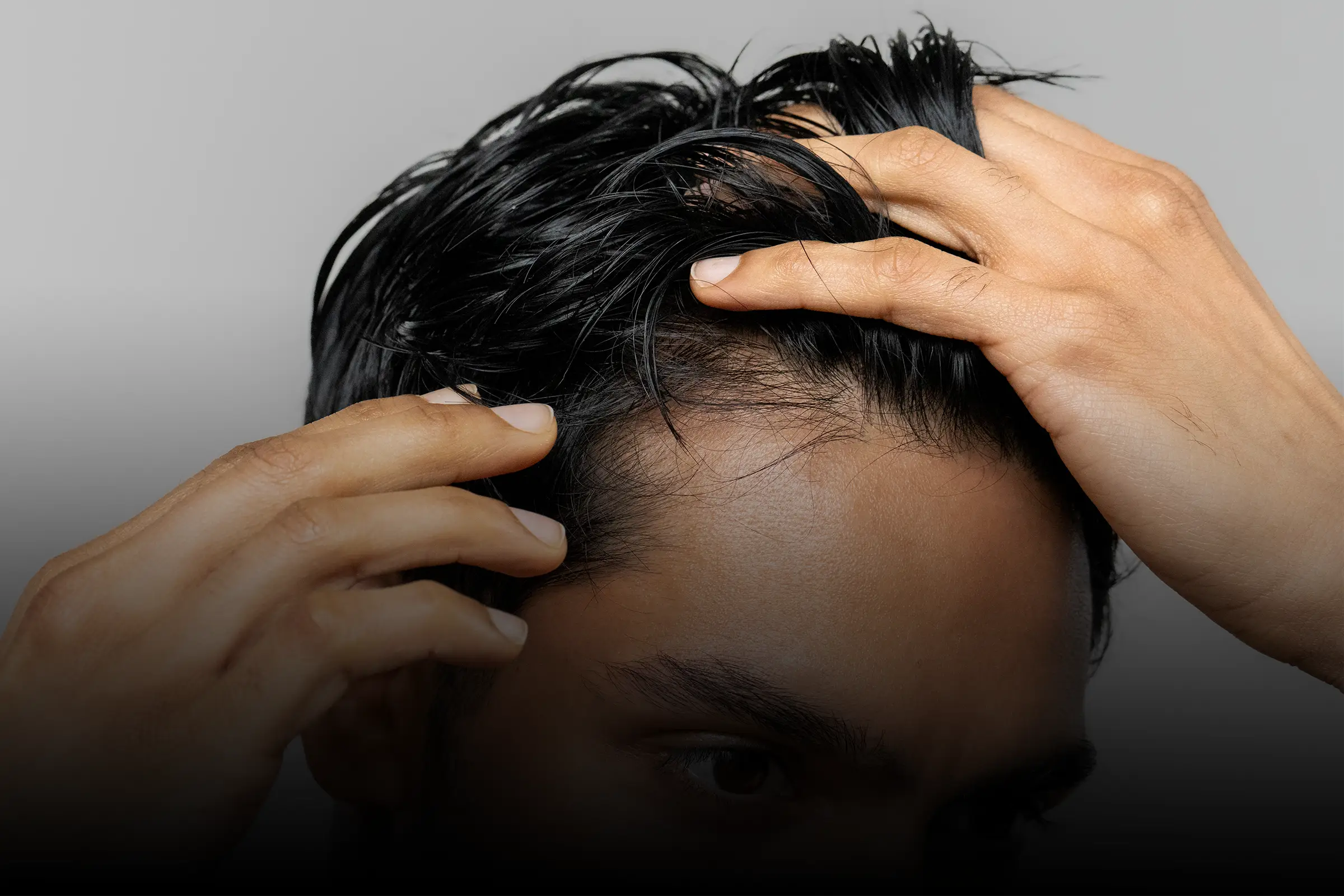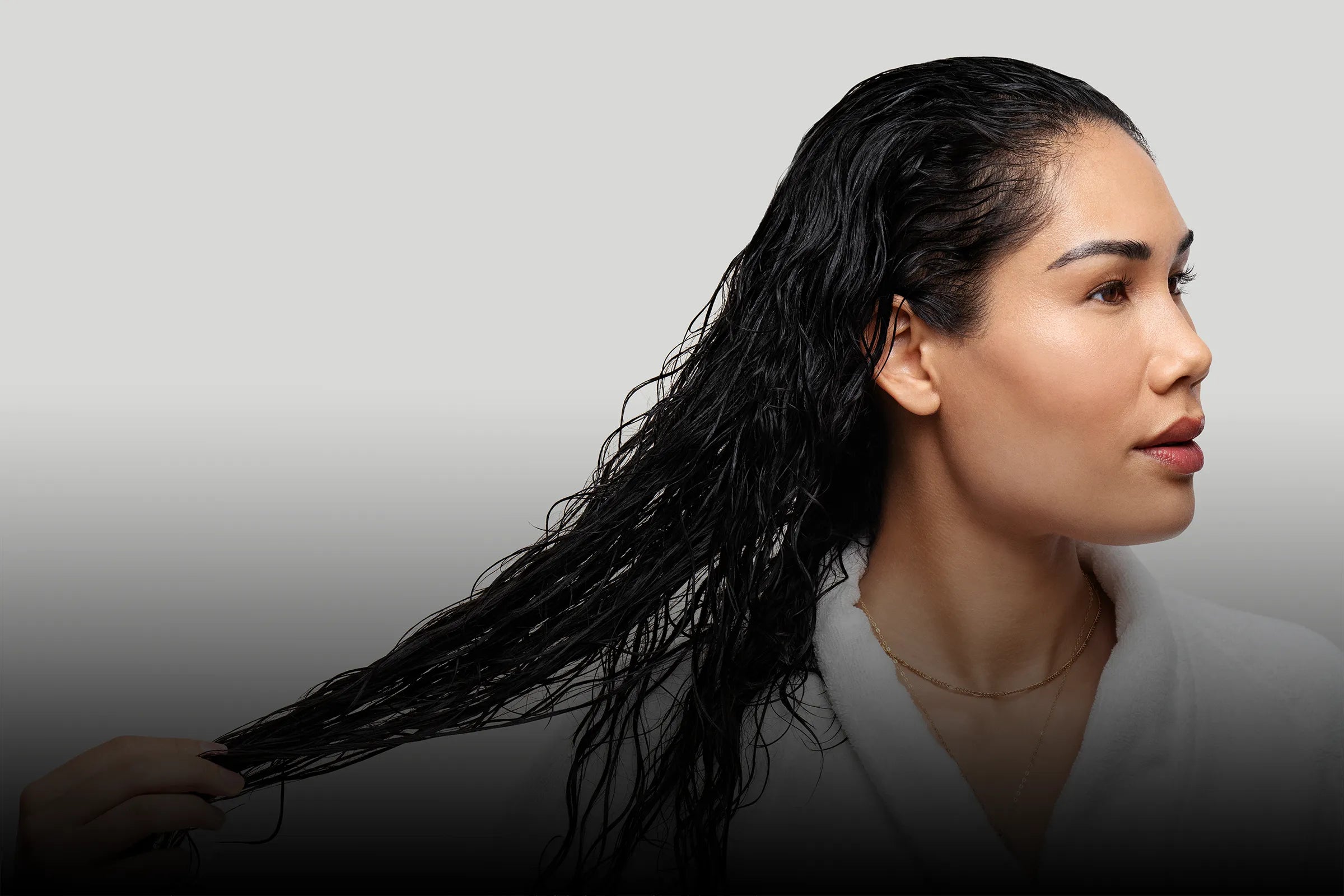It’s estimated that approximately 1 in every 10 women will be diagnosed with polycystic ovarian syndrome (PCOS) (Deswal et al., 2020). PCOS is an endocrine disorder that can have several dermatological symptoms including hair loss. In this article, we’ll review what PCOS is, why it causes hair loss in some women and how hair loss due to PCOS can be treated.
What is PCOS?
PCOS is an example of an endocrine disorder and involves the ovaries, which are normally responsible for secreting sex hormones critical to regulating reproduction. It typically develops around puberty, but in some cases may not become apparent until later in adulthood.
The exact causes of PCOS are not clear, but there does appear to be a strong genetic component to the disorder. It is typically associated with abnormal levels of androgens, or higher than normal male sex steroid production, which may or may not be accompanied by the formation of fluid filled pockets (cysts) in the ovaries. These cysts are believed to be involved in androgen production.
Women who produce excess androgens because of PCOS can experience a variety of signs and symptoms. While androgens are critical to normal male development, they can have some unintended effects in women, including both excess facial and body hair growth and hair loss.
Symptoms of PCOS may include:
- Irregular or missed menstrual cycles
- Weight gain
- Insulin resistance
- Excess facial or body hair (hirsutism)
- Hair loss
- Acne or excessive oily skin
- Skin tags
- Hyperpigmentation (skin discoloration/patches in areas such as armpits, under breasts)
- Infertility
Does PCOS cause hair loss?
PCOS has been associated with hair loss is women and specifically androgenetic alopecia, or female pattern hair loss. When a woman has PCOS, she produces excess quantities of androgens.
It’s been established that androgens such as dihydrotestosterone (DHT), a hormone related to testosterone, play a key role in the development of pattern hair loss in men who have a family history of the condition. When DHT binds to hair follicle cells, hair follicle miniaturization is initiated. Over time, this process damages hair follicles to the point where they cannot produce healthy hair. This leads to the characteristic thinning of the frontal hairline and formation of bald spots seen in male patients with pattern hair loss.
Androgen levels may play less of a role in the development of female pattern hair loss but are recognized as one potential cause of progressive thinning. In comparison to male pattern hair loss which tends to target the hairline and vertex or crown of the head, female pattern hair loss is said to follow a “Christmas tree pattern." When hair is parted directly down the middle, thinning appears wider towards the front of the hairline.
How does this explain the excess facial and body hair that some women with PCOS experience? It turns out that hair follicles respond differently to androgens depending on where they’re located on the body. The same androgens that trigger hair loss on the head also lead to thicker, longer hair growth on the face, torso and limbs.
How do I treat PCOS hair loss?
There are several options for treating hair loss due to PCOS. Women experiencing PCOS-related hair loss should ensure that PCOS is being treated first and hair loss due to the syndrome, second. In the latter case, there are medications that specifically target hair loss that do not treat other symptoms of PCOS.
Medications for hair loss due to PCOS
Treatment of PCOS related hair loss can involve the use of oral contraceptives, anti-androgens, minoxidil or a 5-alpha reductase inhibitor such as finasteride or dutasteride. It’s important to note that many of these medications are prescribed to female patients on an off-label basis, meaning they are treating a condition other than that for which they were originally approved. Some of the medications on this list cannot be taken if you’re trying to conceive, pregnant or breastfeeding. Always talk to your doctor before starting a new treatment.
Oral contraceptives (birth control pills)
Oral contraceptives typically consist of a combination of synthetic estrogen and progestin. These female sex hormones can help regulate the menstrual cycle in PCOS patients and indirectly control androgen production by the ovaries. By helping to reduce androgen levels, oral contraceptives may help treat excessive facial and body hair growth and hair loss at the scalp.
Anti-androgens
Anti-androgens such as spironolactone work by helping to reduce the hormonal effects of androgens. They accomplish this by binding to androgen receptors located on cells to prevent DHT and other androgens from attaching and exerting their effects. It’s also thought that spironolactone also blocks certain enzymes involved in the production of testosterone.
Minoxidil
In contrast to the other medications on this list, minoxidil doesn’t appear to affect hormone levels. It does however, help optimize hair growth by promoting scalp circulation and stimulating hair follicles to spend more time in the active growth phase of the hair growth cycle. Currently, oral minoxidil for women can be prescribed through the XYON platform by a licensed specialist physician.
5-alpha reductase inhibitors
Lastly, a family of medications called 5-alpha reductase inhibitors (5ARIs) which includes finasteride and dutasteride have gained recognition as potential treatments for female pattern hair loss. These medications have not been approved for use in women to treat PCOS or hair loss, so careful consideration must be taken before prescribing these to a woman of childbearing potential.
5-alpha reductase inhibitors work by blocking testosterone’s access to an enzyme called 5-alpha reductase, which is needed to convert testosterone into DHT. This results in a reduction in DHT levels, which in male patients, has been found to be critical to halting the progression of hair loss and encouraging the regrowth of hair. Similar results have been observed in female patients based on several preliminary studies. At XYON, we are pleased to offer our female patients dutasteride for female hair loss.
Other treatments for PCOS hair loss
In addition to the drug-based approaches outlined above, there are other treatments for PCOS hair loss that include low light laser therapy (LLLT) and platelet rich plasma (PRP) therapy. While there is some limited data to support their use in treating thinning hair, neither of these therapies address the hormonal component of hair loss due to PCOS. So, while you may see some improvement, hair loss can continue to progress.
Hair transplant surgery is also an option for hair loss that is relatively advanced and/or unresponsive to other treatments. Surgery comes with its own risks but can result in dramatic improvements in the overall appearance of hair. But there is one caveat: many hair transplant surgeons will recommend taking some form of treatment after a transplant to maintain the results. Why? Since the sensitivity of hair follicles to androgens is determined by genetics and the follicles used for the transplant are obtained from a different region of your own scalp, they will still continue to undergo miniaturization.
Will hair loss due to PCOS grow back?
In many cases, hair loss due to PCOS can grow back. However, because the hormonal triggers for hair loss are complex and their effects are not only limited to the scalp and hair, it’s important to discuss with your doctor whether treatment for PCOS might also benefit the hair loss you’ve noticed. If hair loss treatment is needed, they’ll work with you to ensure that these can safely be taken together with any existing medications. You’ll also want to keep in mind that pattern hair loss is a time-sensitive issue, so the sooner it’s identified and treated, the better your chances of restoring the appearance and health of your hair.
Are there natural treatments for PCOS hair loss?
Again, it’s important to remember that hair loss is a symptom of PCOS and that managing PCOS may have secondary benefits for hair loss. Some research has shown that the hormonal effects of PCOS may be improved by adopting lifestyle changes like eating a diet high in fibre and ensuring that you have enough magnesium and combining these habits with regular exercise to help manage excess weight (Cutler et al., 2019). While these recommendations may not directly cause hair to grow back or stop hair loss from progressing, they can have important effects on metabolism and health overall and help set the stage for better hair.
In addition to lifestyle changes, there are supplements that purport to treat PCOS and hormonal hair loss naturally. We wanted to mention these and acknowledge that they may have a place in some treatment plans. However, ingredients, concentrations and purity are not standardized and most have not been clinically tested for efficacy and safety. We suggest that if natural supplements are something you are interested in, that you discuss adding them with your doctor or another trusted healthcare professional.
PCOS and hair loss: Takeaway
PCOS is an endocrine disorder affecting approximately 10% of women in their reproductive years. The signs and symptoms are wide ranging and include dermatological issues like acne, excessive facial and body hair growth and hair loss on the scalp. These are believed to be due to abnormal levels of androgens. Fortunately, hair loss due to PCOS (female pattern hair loss) can be treated in many ways, including using medications to help manage the effects and production of androgens and promote hair growth. A doctor or specialist physician can help confirm that you are experiencing pattern hair loss and make recommendations for treatment.

























